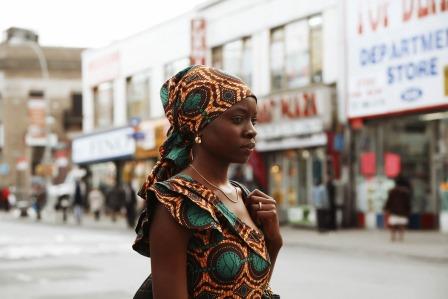Mother of George colorfully and poignantly updates the American immigrant experience in film to Africans in Brooklyn today. The frustrations one family faces between tradition and assimilation, freedom and obligation, financial success, and personal fulfillment feels as movingly universal as their choices are culturally specific.
The opening celebration could be set back home in Nigeria, as Ayodele Balogun (Isaach De Bankolé) has finally been able to afford to bring over his bride, Adenike (Zimbabwean-American actress Danai Gurira, better known as the dreaded warrior in The Walking Dead). Dressed in vibrant prints (thanks to Nigerian-American costume designer Mobolaji Dawodu), the marriage ceremony plays out to the rhythms of their Basotho tribe, culminating in a blessing from the mother of the groom (Bukky Ajayi), who stresses the couple should be fruitful. She pulls the unveiled bride aside to emphasize that she wants a grandchild as soon as possible to be named after her late husband, specifying the future child will be George.
Not everyone there is still steeped in the past. Adenike’s pretty best friend, Sade (Yaya Alafia), dresses in sexy outfits and insists on calling New York her true home. Ayodele’s obligated brother Biyi (Tony Okungbowa, known more as the DJ on The Ellen DeGeneres Show) chafes at having to working long hours under his bossy brother, who paid for him to come over, at their restaurant. But Adenike is so determined to be a traditional wife that she even brings elaborate home-cooked meals to her husband’s work place, until she just seems in the way. Her tentative efforts to establish some independence, particularly financial, using her sewing and domestic skills, threaten her husband’s sense of being a good provider.
But their more fundamental sense of their identities as man and woman, husband and wife, within the narrow confines of the Crown Heights Nigerian community (a diaspora in America rarely seen in the movies) are even more challenged when there is no pregnancy. The constantly demanding mother-in-law insists on traditional fertility treatments, with prayers from priests and concoctions from priestesses, including from Ma Nike (the singer Angélique Kidjo). As the wife anguishes about expensive modern medical treatments as one possible solution, the husband strays into infidelity for masculine reassurance. De Bankolé has a long list of credits with French and indie directors, including Jim Jarmusch, yet his physical charisma has rarely been used so effectively in such an intimate, family context.
Building on debut screenwriter Darci Picoult’s strong-women storyline, and cinematographer Bradford Young’s tight focus on faces, Nigerian-American director Andrew Dosunmu is less artsy than in his first feature about African immigrants, Restless City (2011), so that the drastic decisions the wife makes are wrenchingly and emotionally credible (and parallel the guilt-ridden choices made by the Afghan wife under similar pressures in the recent The Patience Stone). Adenike’s efforts to accommodate herself both to modern America and family pressures also recall the spirit of the immigrant Jewish wife in Joan Micklin Silver’s Hester Street (1975), and ties together women’s experiences across time and space.







I LIKE THIS REVIEW. THANK YOU SO MUCH AND THANK YOU FOR NAMING THE OTHER MOVIES AT THE BOTTOM OF THE REVIEW. THAT MAKES THIS FILM AND THE OTHER EVEN MORE VALUABLE BECAUSE THEY ARE THE STORIES OF WOMEN’S LIVES.–MO